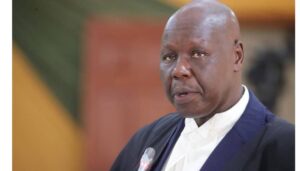National Security Advisory Council joins Supreme Court presidential petition
National Security Advisory Council (NSAC) for the first time in the history of Kenya has filed an affidavit at the Supreme Court in a response to accusations leveled by the Independent Electoral and Boundaries Commission (IEBC) commissioners Boya Molu and Abdi Guliye.
In its affidavit, NSAC has denied allegations that it made attempts to sway the outcome of the presidential election in favour of Raila Odinga.
National Security Advisory Council termed Chebukati’s claims as unfounded and a total misrepresentation of the events that occurred on August 15, 2022, at the Bomas of Kenya.
“It is our humble submission that the said allegations as set out in the impugned Replying – 10 Affidavits are unfounded and a total misrepresentation of the events of August 15, 2022. In order that the Honourable Court is in good stead to determine the real issues in controversy and to do justice to this case, it is imperative that the misconceptions sought to be created in the impugned Replying Affidavits are corrected,” read part of the affidavit.
The allegations, according to NSAC, could harm the reputations of the named public officials, including Hillary Mutyambai, the inspector general of police, Joseph Kinyua, the head of the public service, Kennedy Kihara, the principal administrative secretary in the president’s office, Kennedy Ogeto, the solicitor general, and Lt. Gen. Fredrick Ogolla (Vice Chair of the Kenya Defence Forces).
The council encouraged the Supreme Court to give the aforementioned individuals the chance to present the court with the pertinent data required for it to make an educated conclusion.
“We respectfully submit that it is in the interest of fairness and justice that the Replying Affidavits are admitted, in order to enable the affected persons to set the record straight. The allegations leveled against the affected public officers, if left unrebutted, may form a basis for culpability under various laws, including the Elections Act.”
“It is, therefore, imperative that the said persons are afforded an opportunity to provide this Honourable Court with all the relevant and accurate information as is necessary to enable an informed determination of the matter. This is particularly so because the dispute at hand concerns an election, implicating the people’s right to vote,” the NSAC affidavit read in part.
The IEBC commissioners said in their affidavits that the NSAC members visited the National Tallying Centre (NTC) at the Bomas of Kenya and tried to exert pressure on them to rig the results in Raila’s favor or trigger a run-off.
The NSAC is Kenya’s most potent security agency, according to the Constitution.
The council is made up of strong government representatives who decide crucial matters affecting the safety of almost 50 million Kenyans.
Article 240(2) of the Kenyan Constitution states that the council constitutes the President, the Deputy President, Cabinet Secretary for Defense, Cabinet Secretary for Foreign Affairs, and Cabinet Secretary for Interior and Coordination of National Government.
Other key powerful members are the Attorney General, Chief of Defence Forces, the Director General of the National Intelligence Service (NIS), and the Inspector General of the National Police Service (NPS).
The seven-membered body is tasked with exercising superior control over national security and it performs functions prescribed in national legislation.
Also read,
IEBC explains why presidential votes differed from those of other seats but does it add up
Final DCI and EADH forensic analysis details how gravely IEBC servers were breached
Raila questions IEBC commissioners’ honesty as he responds to Chebukati’s claims of interference
Jubilee Party Headquarters put on auction
Follow us




